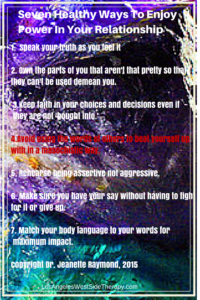Relationship Advice Tips from Dr. Jeanette Raymond, Ph.D.
We all have power in a relationship, but may ‘give’ it away in order to appease, get taken care of, or indulge our need to rely on a loved one.
So it’s less a matter of regaining it as asserting it.
Overwhelmed with the prospect of having to manage the finances of the household, thirty-three-year-old Andy gave his power over to his thirty-two-year-old wife who was a whiz at it. He enjoyed the lack of responsibility and the chance not to have to worry about money. UNTIL his wife complained bitterly that he was not pulling his weight. He would get involved for a short time to appease her, but soon drifted back into his old ways until the next time she exploded. Sometimes he acted like a robot not to feel the shame and blame and other times he was passive aggressive, playing the martyr to her abuser roles.
What if Andy chose one or more of the healthier ways of owning and exerting his power so that he didn’t have to give it away and get it back in the less healthy ways?
Allowing Your Power To Be Used As a Weapon Against You
Determined to be civil and unselfish twenty-nine-year-old Judy prided herself on being a good listener. When her thirty-four-year-old husband Todd was upset about something, she heard him out silently, and didn’t react when she accused him of not caring about her wishes and needs. She allowed him to become abusive, choosing not to assert himself because she wanted to maintain the ideal of keeping her cool, as someone who didn’t have needs, and was unselfishly letting Todd express his feelings.
What if Judy had expressed her feelings in a genuine manner, accepting her shortcomings but not letting Todd use them to demolish her?
Sound good? Then compare the seven ways you can use your power in an unhealthy way that damages relationships with the seven healthy ways of exerting your power without giving it away – and watch how your relationships grow and develop equality, stability and security.
You may need to consider couples therapy to help you manage your insecurity and stress that keeps you blocked.
Unhealthy Ways of Regaining and Asserting Your Power
- Being passive aggressive
- Using Sex to feel powerful by refusing it or insisting/forcing
- Punishing a loved one by backing out of an already agreed upon activity
- Condemnation, Blame and Shame games
- Scoring points – looking for vindication and validation
- Fighting till you psychologically break the other person emotionally
- Acting like a robot
Healthy Ways of Regaining and Asserting Your power
- Speaking your truth to show that you are self-empowered.
- Matching your body language and tone of voice to your words so you come off as sincere and genuine.
- Having alternative ways of feeling attractive and worthwhile that are not linked with your loved ones approval or acceptance
- Owning the parts of you that aren’t that pretty so that it can’t be used to shame and demean you
- Sticking to your own decisions and opinions while allowing your loved one to have theirs.
- Being present in the moment and show your feelings in a contained but vibrant manner
- Being assertive without moving into aggression
Therapy can help you hone these skills because you have been giving over your power for so long you don’t even know you are doing it.
AUTHOR OF ‘Now You Want Me, Now You Don’t! Fear of Intimacy: ten ways to recognize it and ten ways to manage it in your relationships.”
Copyright, Jeanette Raymond, Ph.D. 2015
You might also like:
Are You at War With Yourself or Your Partner?
How to Deal with Verbal Attacks From Your Loved Ones
How to Deal with Being Blamed for Everything
Disclaimer: this article is for informational and educative purposes only. Dr. Raymond is not responsible for any reactions you may have when reading the content or using the suggestions therein. Interacting with this material does not constitute a therapeutic relationship with Dr. Jeanette Raymond.
[/fusion_builder_column][/fusion_builder_row][/fusion_builder_container]



